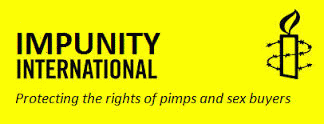The big word in Amnesty's defense of voting to decriminalize the sex industry is protection. All was done to protect the women in prostitution. We were told that the right to buy sex and the right to pimp are measures necessary to protect women in prostitution. In the lead up to the vote, the organization was offended by those who pointed out that its alleged objective of protecting women is a protection racket for pimps and prostitution users.
What poses as Amnesty's masquerade of protection for women in prostitution?
An alleged poverty program for poor women. It was Ken Roth, the director of Human Rights Watch, tweeting his support for Amnesty's proposal, who gave this game away. "Why deny poor women the option of voluntary sex work?" Ken joined the chorus of johns who spout a welfare narrative to justify their sexual exploitation by turning it into a virtue. As one john interviewed said, "These girls gotta eat, don't they? I'm putting bread on their plate. I'm making a contribution."
A policy initiated by the perpetrators who are beneficiaries. As journalist Julie Bindel first revealed, Amnesty took to heart the lobbying of Douglas Fox, co-founder of a UK escort agency, who claimed credit for Amnesty's draft policy. In 2008 as a member of Amnesty, Fox urged the organization not only to support "sex workers" by promoting full decriminalization but also pushed his associates in the sex industry to join the organization. "Getting Amnesty on side will be a huge boost to our morale... we need to pursue them mercilessly..." he said. Amnesty tried to distance itself from Fox arguing he was not a current member and had no input, but his fingerprints and those he represents were all over the policy.
A policy supported by "sex workers," but not by survivors of prostitution. Amnesty listened to only one group of women who claim to represent all women in prostitution -- those who call themselves sex workers -- and most media accounts never challenged this assertion.
There are two voices that claim the authority of experience. One voice -- survivors of prostitution and their allies -- maintain that prostitution is violence against women. Survivors assert that defending the rights of women in prostitution requires prosecuting their perpetrators including pimps and prostitution users, and decriminalizing the victims. This means providing women in prostitution not simply with safe-sex education but also with life alternatives.
The other voice -- sex workers -- is louder, commands more media presence, makes prostitution look sexy, and seems to enjoy more financial support. Those speaking as "sex workers" argue that protecting women means that women should be free to hire "managers," otherwise known as pimps, and that "clients," otherwise known as johns, buyers or prostitution users, should be protected from any legislation such as the Nordic model that makes them accountable for their use and abuse of prostituted women.
A policy that creates the impression that pimps and prostitution users are not only deprived of their rights but are also protectors of the human rights of women.
(Note: You can view every article as one long page if you sign up as an Advocate Member, or higher).





